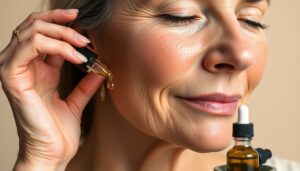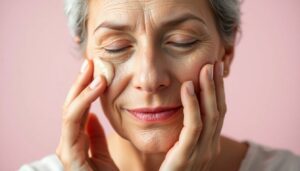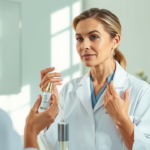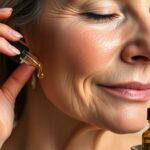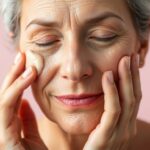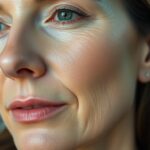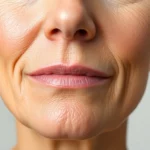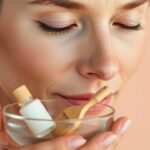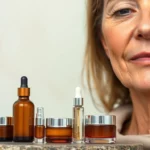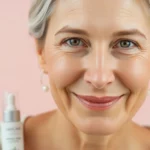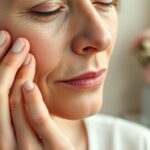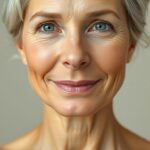What’s Actually Happening to Your Skin as You Age?
What’s actually happening to our skin as we age? It’s more than the appearance of wrinkles. It is based on intricate biological processes. Let’s break it down.
How Collagen and Elastin Work
Collagen and elastin, which are proteins. Think of them as the building blocks of our skin. They make it firm, smooth and elastic. As we grow older, our bodies produce decreasing quantities of these essential proteins. In fact, starting around age 20, you lose roughly 1 percent of collagen each year. This decrease of collagen and elastin causes wrinkles and sagging skin.
It suggests that the environment plays a significant role in this respect.
It’s the environment that can really do some damage to our skin. Sun damage is a huge factor, leading to premature aging. Pollution and lifestyle factors such as smoking and a bad diet also increase the rate at which we age. Shielding your skin from these factors can prevent premature skin damage, ensuring it stays healthier for longer.
Common Signs of Aging Skin
What are the telltale signs of older skin? Check for wrinkles, fine lines, age spots, dryness and a loss of firmness. You might also notice that your skin is sensitive. The first step to correcting them is to notice the signs.
The Heavy-Duty Ingredients Your Skin Craves
There are certain ingredients that work wonders for aging skin. These heavy-hitting ingredients address specific issues. They can moisturize, shield, and restore your skin.
Retinoids: The Gold Standard
Retinoids are considered the gold standard of anti-aging. They do this by increasing cell turnover and stimulating collagen production. A gentler version, called retinol, is marketed in drugstores. Tretinoin is more potent and prescription is required. Start slowly with retinoids. Use them at night to prevent sun sensitivity.
Hyaluronic Acid: Miracle of Moisture
Hyaluronic acid is a humectant hero. It draws and binds moisture into the skin. It can retain up to 1,000 times its weight in water. This helps to fill skin out and soften the look of wrinkles. Mix it into serums or moisturizers for a dewy finish.
Antioxidants: The Enemy of Free Radicals
If you see “antioxidants” mentioned, think of them as being protective from free radicals. These radical molecules attack skin cells. Vitamin C and Vitamin E are strong antioxidants. They act as free radical scavengers, protecting against premature aging. The skin needs to get used to overnight treatment of such products with a daily care routine ourselves.
How to Create Your Anti-Aging Skincare Regimen
And consistency is key for any effective anti-aging skincare routine. A simple, consistent practice can go a long way. Here’s a step-by-step guide.
Morning Routine: Protecting and Hydrating
Use a gentle cleanser to start the day. Afterwards, apply a Vitamin C serum for antioxidant protection. A hydrating moisturizer should be applied. Finish with a broad-spectrum sunscreen of at least SPF 30.
Evening: Repair and rekindle
At night use a double cleanse to take off makeup and pollutions. Apply a retinoid product to stimulate collagen production. Use a thick night cream for skin nourishment. And don’t forget an eye cream for fine lines and wrinkles around the eyes.
Weekly Treatments: Exfoliants and Masks
Try to exfoliate dead skin cells from your face once or twice a week. This allows your other products to penetrate better. Use a mild scrub or a chemical exfoliator (such as AHA or BHA). Face masks can also give it some extra hydration and nourishment. Select masks that address your unique skin issues.
Picking the Right Products: Step-by-Step Guide
It can be very confusing finding the products that are right for your skin. Here are a few suggestions, by skin type and concerns. Keep in mind what works for one individual may not work for another.
Top Cleansers for Older Skin
Seek out mild, hydrating cleansers. Stay away from strong soaps that will wash away your skin’s natural oils. If you have mature skin, your best options are creamy cleansers and oil cleansers.
Best Anti-Aging Serums
Serums are perfect for delivering potent ingredients to your skin. Serums with retinoids, Vitamin C, and hyaluronic acid. These components address wrinkles, dryness and uneven complexion.
Moisturizers That Actually Work For Dry and Ageing Skin
They benefit from thick, emollient creams. Examples include shea butter, ceramides, and hyaluronic acid. These ingredients work to hydrate the skin, protecting the barrier.
The Importance of a Lifestyle for a Youthful Skin
Skincare products can make a difference, but lifestyle choices also have a big impact. Your skin’s health can be affected by diet, sleep and stress management. A holistic approach is best.
Nutrition for Skin Health
Nourish your body with a diet high in antioxidants. Eating plenty of fruits, vegetables, and healthy fats will help nourish your skin from the inside out. Drink More Water — Stay Hydrated Shun processed food and sugary drinks, both of which can trigger inflammation.
The Importance of Sleep
Sleep is critical for skin repair and for skin rejuvenation. Strive for 7-9 hours of slumber each night. Sleep deprivation causes dullness and dryness, and promotes wrinkles.
Stress Management Techniques
Stress can be damaging to your skin. Figure out healthy ways to cope with stress. Yoga and meditation, and being in nature, help. Stay on top of self-care and keep skin and mind in shadow.
Conclusion
Caring for aging skin means understanding what is going on below the surface and selecting the right skin care products. Active ingredients such as retinoids, hyaluronic acid and antioxidants are vital. A reliable skincare regime, along with healthful habits, will sustain the youthful skin. This is the moment to be taking care of your skin!


